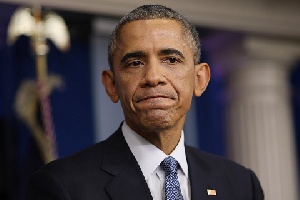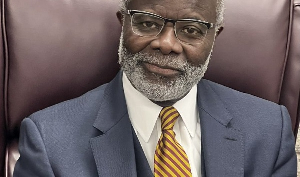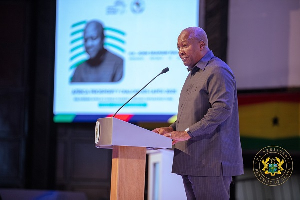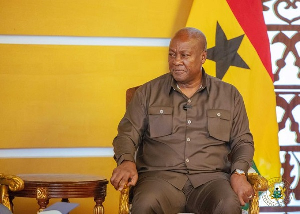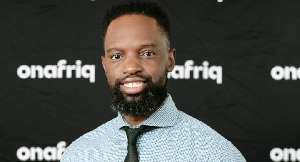Pressure is building on the Nelson Mandela Foundation to withdraw an invitation to former US President Barack Obama who is scheduled to travel to South Africa next month to deliver the NGO's annual lecture, which this year marks the late anti-apartheid icon's birth centennial.
In an open letter, the Cage Africa advocacy group said that during his eight-year tenure as president and commander-in-chief of the US army Obama was directly responsible for a massive expansion of US military operations in Africa, including special operations and drone attacks.
"Giving this man a platform would be tantamount to condoning these actions, something that Nelson Mandela would surely have stood against," the letter, published earlier this month, read.
"This is especially pertinent given Nelson Mandela's legacy as an individual who was also once designated a 'terrorist' and suffered torture and imprisonment as a result, and who despite this is now regarded as one of the pre-eminent figureheads for justice around the world."
The NGO's 16th annual lecture is scheduled for July 17 in Johannesburg. An estimated 9,000 people are expected to attend the event, in which Obama is expected to speak on "Renewing the Mandela Legacy and Promoting Active Citizenship in a Changing World".
Karen Jayes, Cage Africa spokesperson, told Al Jazeera that failing to rescind the invitation would cement a belief that the Nelson Mandela Foundation "is part of what many see as the 'whitewashing' of Mandela's legacy".
Responding to the criticisms from Cage Africa, the Nelson Mandela Foundation would not say if they were reconsidering their invitation, but admitted that they were "taking the concerns seriously".
Spokesperson Lunga Nene told Al Jazeera that Obama had been selected as part of the Foundation's special focus on legacy given that 2018 marks 100 years since Mandela's birth.
Nene said that it was clear that Mandela, a former president and a hero in the struggle against apartheid South Africa, had held "great respect for President Obama".
"As a legacy institution we also have had to grapple with the contestation of Madiba's legacy, particularly from younger people," added Nena, using the clan name by which Mandela was widely known in South Africa.
"Both leaders were challenged by difficult circumstances during their time in office, and both reflected on mistakes and regrets after leaving office. We have asked President Obama to address these issues," Nene said.
Obama's record
The 2009 election of Obama, the US' first black president, was met with much optimism across Africa. The belief at the time was that Obama, whose father was born in Kenya, would be personally invested on the continent.
But by the end of his presidency, observers said Obama had failed to live up to the expectations and deliver a substantial legacy, citing vague policies and a continuation of a paternalistic approach towards Africa that ultimately prioritised security over economic partnership and investment.
Oumar Ba, professor in African-American studies in Morehouse, Atlanta, told Al Jazeera Obama would be remembered for "the militarisation of US foreign policy on the African continent, his use of drones, his immigration policy and his disastrous intervention in Libya."
In a 2015 speech at the African Union headquarters in Ethiopia, Obama called on some of the continent's elder statesmen to step down. But critics said the president of the US had "no moral right to lecture Africans", dismissing what they said appeared to be a tone-deaf message given his country's continued support for some of the continent's autocratic leaders.
"Obama pursued the same predatory and criminal policies that provoked international anger and hatred under his predecessor George W Bush," Ibrahim Vawda, of the South Africa-based Media Review Network, said in a statement also calling the Nelson Mandela Foundation to withdraw its invitation.
"His stated theme of promoting 'democracy' in Africa was absurd and hypocritical."
In response to questions seeking comment on the developing concerns in South Africa ahead of the July event, a spokesperson for the Obama Foundation would only say that they were looking forward to the former president's lecture, describing it "as an opportunity to discuss creating conditions for bridging divides, working across ideological lines, and resisting oppression and inequality".
Mandela's legacy
Na'eem Jeenah, director of the Johannesburg-based Afro-Middle East Centre (AMEC), said Obama was an apparently carefully-made choice by the Nelson Mandela Foundation.
"I suspect that the foundation will argue that they choose speakers with whom they do not necessarily agree, but who will be able to drive forward debate and discussion on critical issues facing the world today," Jeenah said.
Jeenah added that that it wasn't surprising that there was opposition to the event. He expected the dissent to increase in the coming days.
"The argument is that Obama, through his actions as president, most certainly does not represent Mandela's legacy … [and] the past decade of Obama's life does not suggest to us that he has the credentials to talk about renewing Mandela's legacy or that he has been active in promoting active citizenship - either in his own country or abroad," he says.
But Ottilia Anna Maunganidze, head of Special Projects at the Institute of Security Studies (ISS) in Pretoria, said that while she had no qualms about Obama's lecture, she agreed that the event deserved the scrutiny it was currently receiving.
"He no longer wields state power [but] calls for accountability should not be limited to people still in office.
"It is important that beyond rhetoric, [that Obama] reflects critically on the negative issues people raise as well. Of course, whether such a platform isn't better-placed for an African leader (political or otherwise) to address is another issue altogether," Maunganidze told Al Jazeera.
Nene, from the Mandela Foundation, said it is not the first time the Foundation has been criticised for their choice of speaker.
In 2015, the NGO received complaints for inviting economist Thomas Piketty while in 2016, there were concerns over the decision to call Bill Gates.
Other past speakers include former US President Bill Clinton, Archbishop Desmond Tutu and former UN Secretary-General Kofi Annan.
Jeenah, from AMEC, said despite the impossibility of making everyone happy, critics were unanimous on one point.
"At the very least, they [critics] believe that the speaker, especially on Mandela's 100th birthday, should be someone who actually does represent Mandela's legacy, and it should preferably be an African."
General News of Monday, 25 June 2018
Source: aljazeera.com





